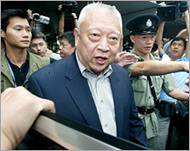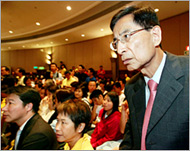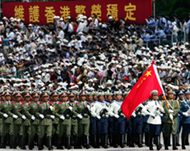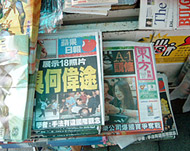Hong Kong: Whither media freedom?
The question of pernicious self-censorship remains a topic of considerable concern for Hong Kong’s free-speech activists.

Published earlier this year, an annual report by the Hong Kong Journalists Association reiterated a long-running complaint that the freedom of the city’s media is under threat from Beijing.
Included in the report were comments on last year’s half-million person march, the controversial departure in May of three outspoken radio hosts, and the existence of a policy of self-censorship among editors that tilts the bulk of reporting towards either a pro-Beijing or politically neutral angle.
The real truth about the radio hosts remains a matter of conjecture; heavy indebtedness was cited by some as the actual reason for the sudden exit of at least one of them.
Sensitive issues
“In the run-up to the 1997 handover, you began to see a diminishing of the political spectrum,” long-time foreign journalist Francis Moriarty told Aljazeera.net. “Papers that used to be in the middle shifted left, and those on the right, like the pro-Taiwanese press, closed down.”
 |
|
Criticising Chief Executive Tung |
Newspapers, almost without exception, were under the control of conglomerates with wider business interests in mainland China, so during the late 1990s they took a noticeably more deferential attitude to reports of sensitive issues such as Tibet or Taiwanese independence.
But with very little put in writing, judging the scale of self-censorship remains difficult. Is it a top-down approach from the owners, or have editors taken it upon themselves to second-guess the wishes of the boss? Or is it all over-exaggerated?
“Censorship was not overt like Singapore or Malaysia,” former South China Morning Post satirist Nuri Vittachi told Aljazeera.net. “It was subtler, with outspoken writers or cartoonists just not being employed any more.”
After he was fired from Hong Kong’s most renowned English language daily in 1997, Vittachi wrote a book cataloging the steady creep of self-censorship across the paper.
Opposed views
“Nothing was written down. Once though there was an email from the editor that caused quite an upset, saying that the word ‘massacre’ should no longer be used when referring to Tiananmen Square,” Vittachi said.
However, not all observers are in agreement and some believe the issue has become deeply politicised.
 |
|
Politician Martin Lee: Hong Kong |
“I find the line that self-censorship is exercised to be hackneyed, stereotyped and untrue,” Thomas Hon Wing Polin, a university lecturer on media and magazine editor, said.
“I feel that the papers are as critical of Beijing as ever and, although people will cite specific incidents, this does not mean there is systematic self-censorship.”
Instead, says Polin, there was a period of adjustment around the handover when the “one country, two systems” structure was first being tested.
Causing concern among newspaper owners as to how to report on their new masters, there was a jump to the left that is only now being modified as demonstrated by last year’s heated reporting on SARS and the failing capabilities of the chief executive, Tung Chee-hwa, who now has few allies left.
Weak evidence
In addition, in the Hong Kong Journalists Association (HKJA) report, the compilers say that the print media is continuing to slide towards Beijing. Yet to support this they quote a single chart from a university study that examined newspaper coverage of the “patriotism debate” from earlier this year.
|
“Censorship was not overt like Singapore Nuri Vittachi, former columnist on South China Morning Post |
The debate started when Beijing laid down arbitrary criteria as to what constitutes a patriot. The chart shows that 55% of articles showed pro-Beijing tendencies while 15% were clearly against.
The problem is, the HKJA is known to be a highly political organisation as the title of its 2004 report, Beijing Turns The Screw: Freedom of Expression in Hong Kong Under Attack, suggests, and to sum up a year’s worth of self-censorship with one chart raises doubts.
In another example, Democrat Party member Martin Lee (whose critics accuse him of creating a “fear China” mentality) suggested to Aljazeera.net just before the 12 September election that Hong Kong was in desperate need of an openly critical press, more so than ever before.
Fears hyped
“You can no longer be sure that even the rule of law exists in Hong Kong. It is still there in litigation between citizens. Other than that, you can never be sure,” said Lee.
But despite questioning a number of them, Aljazeera.net could not find any Hong Kong lawyers who agreed with Lee’s statement, although some questioned his sincerity.
 |
|
Anti-Beijing papers are |
“I think there are people who hype fears of what Beijing may do. The more hype an issue receives in the media, the more sensitive Beijing will become. To overstress something therefore becomes a preventive measure,” Polin said, pointing to the HKJA report as an example.
Although it may be that the dangers of self-censorship are being overplayed, threats to free speech do exist. Pressures are very obviously placed on certain publications that have taken an avowedly anti-Beijing line.
The Apple Daily, a sensationalist Chinese language tabloid, has no advertising clients from any of the big property developers, all of which have interests in the mainland, instead relying on small- to medium-sized businesses.
Nor are any of its journalists being granted work permits for the mainland after the paper’s owner called the former Chinese leader, Li Peng, “a big turtle egg”.
Potent question
Even so, says its director of public affairs, Liu Kin-Ming, the daily turns a healthy profit and holds the largest (audited) circulation of any daily.
And it is no secret that the Kuok family, which owns the South China Morning Post as well as the Shangri-La Hotel Group, had hoped to turn the paper into something altogether more Beijing friendly.
Opposition from its own journalists and a guaranteed fall in readers appear to have persuaded them otherwise, and the paper is now supposedly up for sale.
 |
|
The owners of many dailies |
In fact, the ownership structure of papers has been questioned in the past, as there are possible conflicting interests between running an objective newspaper and currying favour with China’s political leaders.
One suggestion was to disallow companies with business interests in the mainland from owning papers. But, given the tight economic links between the two regions, this is impractical.
A more potent question might be whether, when the mainland press is finding its own voice, Beijing is really interested in the parochial goings-on in Hong Kong journalism.
“I think now the Chinese language media are criticising anyone they like,” Vittachi said in opposition to the idea that the media is kowtowing to Beijing. “They are returning to their free self.”
Talking to Aljazeera.net, a number of journalists, editors and commentators expressed varying positions suggesting that, while challenges remain, the reality is less dramatic than some believe.